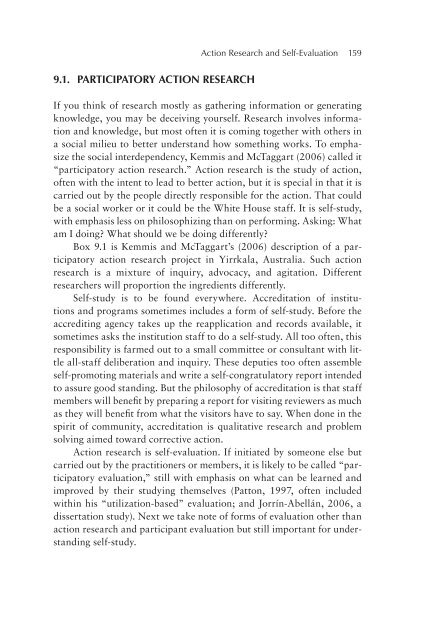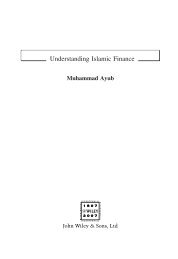How Things Work - Doha Academy of Tertiary Studies
How Things Work - Doha Academy of Tertiary Studies
How Things Work - Doha Academy of Tertiary Studies
You also want an ePaper? Increase the reach of your titles
YUMPU automatically turns print PDFs into web optimized ePapers that Google loves.
9.1. PaRticiPatORY actiON ReseaRch<br />
action Research and Self- evaluation 159<br />
If you think <strong>of</strong> research mostly as gathering information or generating<br />
knowledge, you may be deceiving yourself. Research involves information<br />
and knowledge, but most <strong>of</strong>ten it is coming together with others in<br />
a social milieu to better understand how something works. To emphasize<br />
the social interdependency, Kemmis and McTaggart (2006) called it<br />
“participatory action research.” Action research is the study <strong>of</strong> action,<br />
<strong>of</strong>ten with the intent to lead to better action, but it is special in that it is<br />
carried out by the people directly responsible for the action. That could<br />
be a social worker or it could be the White House staff. It is self-study,<br />
with emphasis less on philosophizing than on performing. Asking: What<br />
am I doing? What should we be doing differently?<br />
Box 9.1 is Kemmis and McTaggart’s (2006) description <strong>of</strong> a participatory<br />
action research project in Yirrkala, Australia. Such action<br />
research is a mixture <strong>of</strong> inquiry, advocacy, and agitation. Different<br />
researchers will proportion the ingredients differently.<br />
Self-study is to be found everywhere. Accreditation <strong>of</strong> institutions<br />
and programs sometimes includes a form <strong>of</strong> self-study. Before the<br />
accrediting agency takes up the reapplication and records available, it<br />
sometimes asks the institution staff to do a self-study. All too <strong>of</strong>ten, this<br />
responsibility is farmed out to a small committee or consultant with little<br />
all-staff deliberation and inquiry. These deputies too <strong>of</strong>ten assemble<br />
self- promoting materials and write a self- congratulatory report intended<br />
to assure good standing. But the philosophy <strong>of</strong> accreditation is that staff<br />
members will benefit by preparing a report for visiting reviewers as much<br />
as they will benefit from what the visitors have to say. When done in the<br />
spirit <strong>of</strong> community, accreditation is qualitative research and problem<br />
solving aimed toward corrective action.<br />
Action research is self- evaluation. If initiated by someone else but<br />
carried out by the practitioners or members, it is likely to be called “participatory<br />
evaluation,” still with emphasis on what can be learned and<br />
improved by their studying themselves (Patton, 1997, <strong>of</strong>ten included<br />
within his “utilization-based” evaluation; and Jorrín-Abellán, 2006, a<br />
dissertation study). Next we take note <strong>of</strong> forms <strong>of</strong> evaluation other than<br />
action research and participant evaluation but still important for understanding<br />
self-study.

















